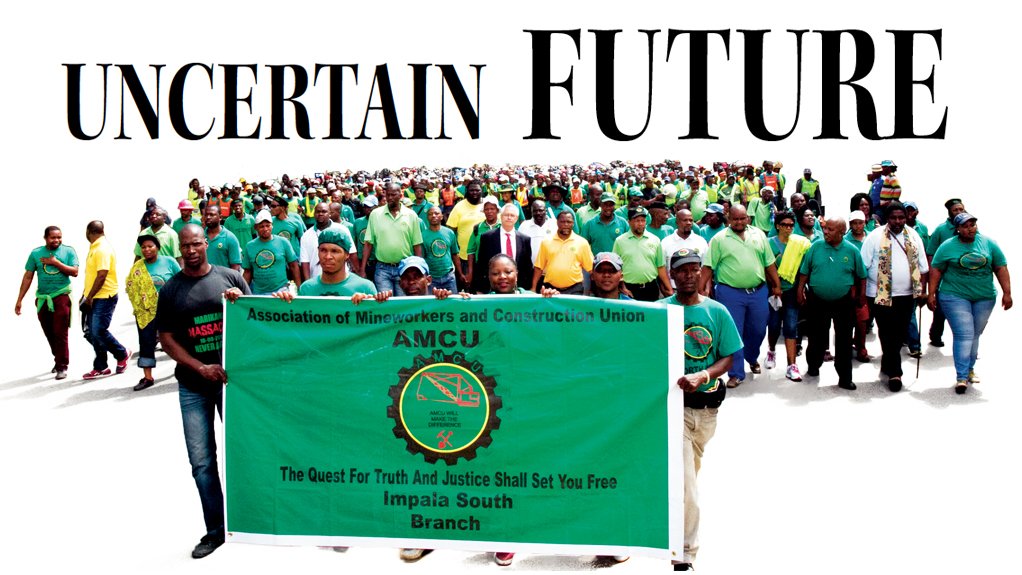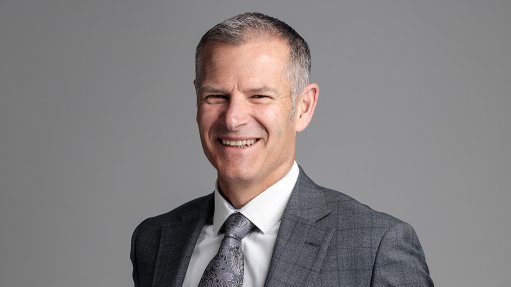Jury still out on the platinum strike's impact on AMCU membership
Following the crippling five-month platinum- sector strike, which severely affected not only businesses in Rustenburg but also the South African economy and resulted in mineworkers and their families having to live in poverty, the Association of Mineworkers and Construction Union’s (AMCU’s) future may be hanging in the balance.
Following the signing of a new wage agree- ment last month, AMCU president Joseph Mathunjwa lauded the strike as a “victory for all workers in South Africa” as “platinum-belt workers fought a good fight, which yielded a successful result”. However, economists and analysts seem not to be as convinced of the union’s bright future.
Economists.co.za economist Mike Schüssler tells Mining Weekly it will be impossible for the mineworkers, who were on strike from January 23 to June 24, to make up the wages they lost in that period, pointing out that these workers have also incurred significant debt, which could impact negatively on AMCU and its future.
“I don’t think AMCU will survive this. [The workers] are going to take such a long time to recover from this strike and it is very likely that there is going to be a lot of restructuring [in the platinum mining sector].”
He adds that, should AMCU become an even bigger union as a result of this strike, the mining industry and its workers will have to rethink their views: “How can someone who puts you into poverty and who makes you poorer than you would have been . . . attract more people? All these things add up and I don’t think AMCU is going to get bigger.”
Schüssler explains that the average striking worker has lost about 41.9% of his/her year’s earnings as a result of the industry’s no work, no pay principle.
“They were going to get an 8% increase before the strike started, so they have to get more than 41.9%. . . which leaves them [needing a] 49.9% [increase].
“If you take debt into account, we estimate, conservatively, that it at least adds another 8% [to the miners’ deficit]. There will also be another period of about three months, or more, during which the mineworkers will not receive production bonuses because production will be ramping up, which will probably add another 12% [to their loss].
“With tax effects and [these] other factors, a platinum-belt mineworker will probably need an increase of 70% or higher in year one to make up for the losses. He is not going to get that. And he is not going to get that over three years,” Schüssler tells Mining Weekly.
Meanwhile, labour relations and employment law consultancy Andrew Levy Employment managing partner Andrew Levy says that, despite the suffering endured by the mine- workers during the five-month strike, the employees still regard the strike and settlement as a victory.
He adds that, while some might say that the workers lost more than they gained, it is “not about what we believe – it is about what the workers believe”, adding that the platinum- belt workers believe they won and, more importantly, workers in other sectors of the mining industry regard the strike as a victory for the working class.
Therefore, Levy believes that, if AMCU capitalises on this victory, the union can grow “tremendously” and become a powerful force in the mining industry.
However, he states that AMCU’s future depends on two factors – whether rival union the National Union of Mineworkers (NUM) will fight back and whether AMCU will manage to strengthen its organisational capability.
Levy maintains the NUM will not take AMCU’s increasing dominance “lying down” and will most certainly fight back.
“If the NUM learnt [its] lesson and can [mobilise] to show that it has its members’ interests at heart . . . it could succeed,” he says.
The NUM’s will to fight was confirmed by South African Communist Party (SACP) secretary-general Dr Blade Nzimande at the NUM’s central committee meeting earlier this month.
“As an aftermath of the platinum strike, a story has surfaced that the conclusion of the strike was synonymous with the NUM and our movement being defeated and dislodged. We wish those good luck because, no matter what is said, we have confidence that the NUM will regain the [advantage], as those workers will realise which union is best placed to represent them and their interests,” Nzimande said to the applause of about 650 NUM delegates in attendance.
Meanwhile, Levy maintains that if AMCU can transform into a permanent organisation, it will face the NUM not only on equal terms, but also on slightly improved terms.
He adds that, for a union of AMCU’s size and importance to be run successfully, a “competent, well-structured and disciplined organisation needs to be built”. This will, in turn, result in the union ceasing to be a “cult” built around Mathunjwa and becoming an organisation, in the true sense of the word.
This view is echoed by trade union Solidarity general secretary Gideon du Plessis.
In the union’s quarterly ‘Labour Market Report’, released last month, Du Plessis says AMCU has reached a crossroads and will only remain a factor going forward if the union begins to act without a hidden agenda and operates like a “normal trade union should”.
He says this will entail increasing AMCU’s staff complement and offices throughout the mining industry, training its officials and par- ticipating in mainstream industry forums.
Du Plessis adds that the union will also have to develop “a sense of reality”, putting members interests in job security first, “rather than making it subservient to an ideological mindset”.
Schüssler reiterates that, if AMCU does survive, it will have to “grow up quickly” and that, should there be another dispute, the union cannot state that there is an agreement in principle, only to make more demands later on.
Levy does not expect the union to become the predominant union overnight, as this will have to be a medium-term shift, depending on whether the union manages to build permanent structures.
Financial services company Cadiz mining analyst Peter Major agrees that a shift in the labour space will not happen immediately, but believes that, in six months to a year, the picture will be much clearer.
Further, Major remains uncertain about whether the platinum strike will gain or lose AMCU members in the long run, as Mathunjwa is “good at managing his reputation” and has a “reputation of getting things done and getting members the increases they want”.
Major says Mathunjwa keeps getting bolder, and the more support he gets, without repercussion, the more confident he becomes.
He adds that, while Mathunjwa is lucky the strike ended when it did, AMCU still secured the workers a decent package.
Major, does, however, concur with Schüssler that the workers will never make up the losses they suffered during the five-month strike, as “. . . virtually no one in a strike ever makes up what is lost – neither the company, the country nor the workers”.
Meanwhile, Schüssler notes that, if workers do not leave AMCU, the union will still lose members through the operational restructuring that is likely to take place in the platinum sector.
During the strike, AMCU demanded that no restructuring take place once a new agreement was reached, but the mining companies did not commit to this.
“I think you are going to see more than a third of the people lose their jobs in a short period of [about] three years, and that brings down membership [numbers],” Schüssler says, adding that AMCU will, therefore, lose members either way.
Future Labour Space
Levy says there are three possible scenarios that could characterise the mining labour space going forward.
“The first possible scenario is that there will be union rivalry between the NUM and AMCU, and that is a bad news. Another scenario is that AMCU will build an organisation and become a growing force, which means that employers will have to deal with two unions.
“Scenario three is probably the best for the employers: If AMCU decides to join the existing structures of the centralised bargaining forum,” he explains.
Levy maintains that AMCU and the NUM will continue to dominate the mining industry labour space and it is unlikely that a new union will emerge.
Meanwhile, Major believes that, should workers move away from AMCU to join other unions in the coming months, the NUM will regain its position as the majority union.
“There are some small unions that were formed during the second and third months of the strike, but I don’t know what they are going to offer that workers can’t get from Solidarity, AMCU or the NUM,” he says.
Schüssler says that, while he also expects the NUM to regain some of its members, some of the workers may also choose to join other smaller unions.
Comments
Press Office
Announcements
What's On
Subscribe to improve your user experience...
Option 1 (equivalent of R125 a month):
Receive a weekly copy of Creamer Media's Engineering News & Mining Weekly magazine
(print copy for those in South Africa and e-magazine for those outside of South Africa)
Receive daily email newsletters
Access to full search results
Access archive of magazine back copies
Access to Projects in Progress
Access to ONE Research Report of your choice in PDF format
Option 2 (equivalent of R375 a month):
All benefits from Option 1
PLUS
Access to Creamer Media's Research Channel Africa for ALL Research Reports, in PDF format, on various industrial and mining sectors
including Electricity; Water; Energy Transition; Hydrogen; Roads, Rail and Ports; Coal; Gold; Platinum; Battery Metals; etc.
Already a subscriber?
Forgotten your password?
Receive weekly copy of Creamer Media's Engineering News & Mining Weekly magazine (print copy for those in South Africa and e-magazine for those outside of South Africa)
➕
Recieve daily email newsletters
➕
Access to full search results
➕
Access archive of magazine back copies
➕
Access to Projects in Progress
➕
Access to ONE Research Report of your choice in PDF format
RESEARCH CHANNEL AFRICA
R4500 (equivalent of R375 a month)
SUBSCRIBEAll benefits from Option 1
➕
Access to Creamer Media's Research Channel Africa for ALL Research Reports on various industrial and mining sectors, in PDF format, including on:
Electricity
➕
Water
➕
Energy Transition
➕
Hydrogen
➕
Roads, Rail and Ports
➕
Coal
➕
Gold
➕
Platinum
➕
Battery Metals
➕
etc.
Receive all benefits from Option 1 or Option 2 delivered to numerous people at your company
➕
Multiple User names and Passwords for simultaneous log-ins
➕
Intranet integration access to all in your organisation





















